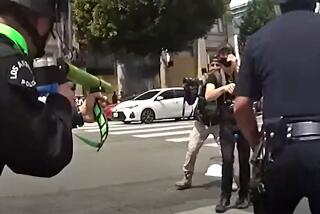Judge OKs AIDS Test of Man Who Bit Officers
SAN DIEGO — A Municipal Court judge Wednesday authorized testing for AIDS antibodies in the blood of a homosexual man who bit two police officers at a gay pride parade, ruling that the state’s right to investigate a potential crime outweighs the man’s privilege of confidentiality.
Gay rights advocates protested the ruling, warning that it forged a dangerous loophole in what previously had been an ironclad prohibition in California against disclosing the results of AIDS-related blood tests.
The ruling, described by San Diego Municipal Judge Raymond Edwards Jr. as the first of its kind in the state, will be appealed. The testing will not be conducted without a higher court’s approval, according to attorneys involved in the case.
Brian Barlow, 39, of San Francisco is charged with battery against a police officer for biting San Diego Police Officer Ray Shay and Reserve Officer George Ground after an altercation June 7 with religious fundamentalist counter-demonstrators at the annual Gay Pride Parade in San Diego.
‘I’ve Got AIDS’
While being treated at a hospital for minor injuries he suffered in the struggle, Barlow told a police investigator that he is a homosexual. According to a police affidavit, Barlow said: “You better take it that I’ve got AIDS for the officers’ sake.”
Concerned that the two officers might have been exposed to the AIDS virus, police ordered a blood sample drawn from Barlow for testing. But Barlow objected to the testing and a series of hearings was conducted in San Diego Municipal Court to determine whether the blood could be tested for AIDS without his consent.
In final arguments Wednesday, defense attorney Peter Hughes said that state law clearly prohibits the use in criminal proceedings, without the subject’s consent, of the results of blood tests for the presence of AIDS--acquired immune deficiency syndrome--or AIDS antibodies.
The law, AB 403, was passed by the Legislature last year. It was designed to limit the spread of the disease and to maintain the purity of donated blood supplies by reassuring people who suspect they had been exposed to AIDS that they could submit to blood tests with the certainty that the results would remain confidential.
Deputy Dist. Atty. Sally Penso argued that the testing law contradicts provisions in the state Constitution granting law enforcement agencies the power to investigate possible crimes.
The prosecution’s main objective in seeking the test of Barlow’s blood was to aid in medical treatment for the two officers, she said. But Penso acknowledged that prosecutors also could escalate the charges against Barlow--perhaps charging him with assault with a deadly weapon--if the tests show that he had the capacity to infect the officers.
In earlier hearings, Hughes had disputed the reliability of the AIDS blood tests and noted that medical evidence indicated that there were no known cases of someone contracting the disease by being bitten by a person infected with AIDS.
Calls Tests Reliable
But Penso contended that three widely used tests, conducted in tandem, are highly reliable monitors of the presence of the AIDS antibody, and she said an epidemiologist’s testimony indicated that the presence of the antibody in an individual’s blood almost always means that the person is capable of transmitting the disease.
Edwards ruled that the tests could be conducted but that the results could be revealed only to Penso, Barlow and Hughes, not to the two police officers.
When “harmonized” with the state Constitution and Penal Code provisions, Edwards said, AB 403 “does not prohibit the taking of the blood or the testing of blood” for AIDS antibodies under a court order, if probable cause has been shown that a crime may have been committed.
Ben Schatz, director of the San Francisco-based AIDS Civil Rights project, said the ruling, if allowed to stand, would erode the rights of homosexuals, encourage discrimination against them and jeopardize public confidence in the confidentiality of AIDS-related blood tests.
“What the judge has done is to take an extraordinarily remote medical threat, which can be measured by checking out the police officers, and (to use that to) justify imposing a severe infringement upon civil rights,” Schatz said.
More to Read
Sign up for Essential California
The most important California stories and recommendations in your inbox every morning.
You may occasionally receive promotional content from the Los Angeles Times.










